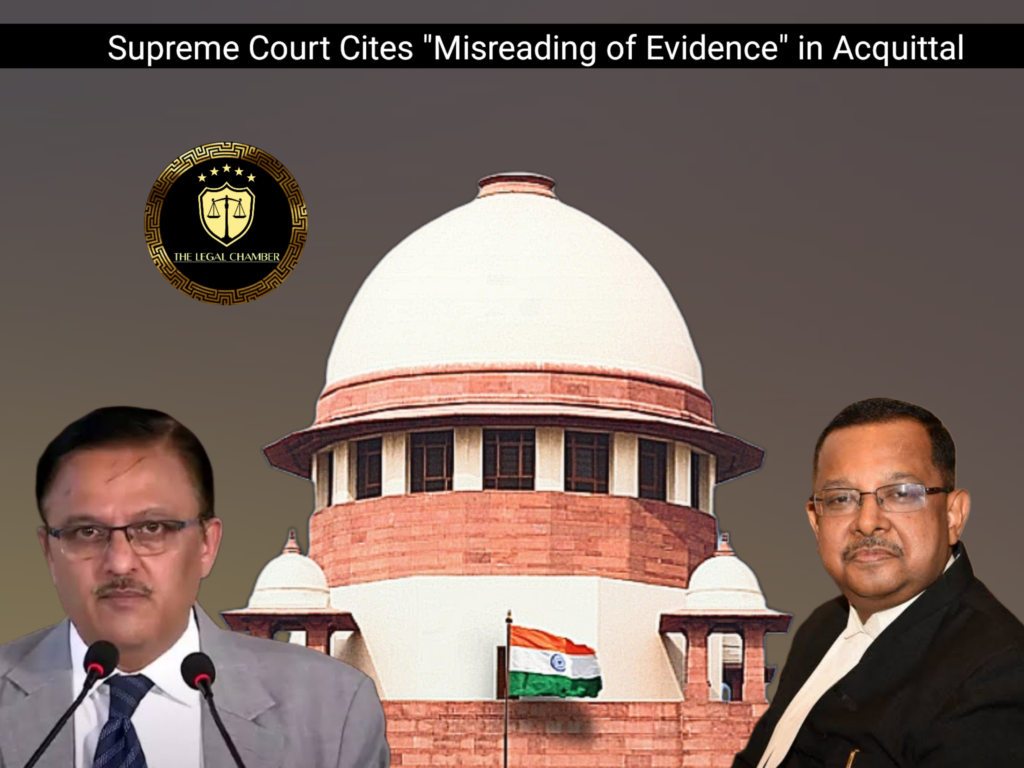
The Supreme Court, exercising its appellate jurisdiction under Article 136, set aside the concurrent convictions of the appellants, finding that the Trial Court and High Court had misread and ignored striking features of the prosecution’s evidence. The Court highlighted issues with witness credibility, unexplained delays in statements, and unreliable corroborating evidence, concluding that guilt was not proven beyond reasonable doubt
Facts Of The Case:
In 2011, the wife of PW-1 won the Panchayat Board elections, a position held by Accused No. 1’s family for approximately four decades. This led to numerous skirmishes between the two sides in the months following the elections. On the night of November 14, 2012, PW-1’s brother (Deceased No. 1), his son (Deceased No. 2), and daughter (PW-9) were traveling in a car driven by Deceased No. 3. Around 9:30 p.m., a truck grazed their car, and after the car stopped, Accused No. 1 and others arrived on motorbikes and from the truck. The group, armed with weapons, attacked the car and its occupants, attempting to set them on fire. PW-1 escaped and hid in a nearby bush. The attackers killed the three deceased and inflicted serious knife injuries on PW-9. They fled when police officers in uniform were spotted. PW-1 then narrated the incident to police, leading to an FIR being registered against thirty accused persons. A chargesheet was filed against twenty-one persons, with fifteen names dropped by the prosecution with PW-1’s consent. The prosecution also relied on fingerprints, recovered weapons, and paint flakes as evidence. The Trial Court convicted Accused Nos. 1 to 11, sentencing them to life imprisonment, and acquitted Accused Nos. 12 to 21. The High Court upheld these convictions
Procedural History:
A First Information Report (FIR) was registered on November 4, 2012, based on a complaint made by PW-1, under various sections of the IPC and the Tamil Nadu Prevention of Damage to Public Property Act. During the investigation, thirty-six persons were initially arrayed as accused, but fifteen were subsequently dropped by the prosecution with PW-1’s consent, and a chargesheet was filed against twenty-one individuals. The Trial Court, after examining fifty-eight witnesses including key eyewitnesses PW-1, PW-2, and PW-9, delivered its judgment on September 29, 2015. It convicted Accused Nos. 1 to 11, sentencing them to life imprisonment, and acquitted Accused Nos. 12 to 21 of all charges. Accused Nos. 1 to 11 then appealed their conviction to the High Court of Madras at Madurai. The State and PW-1 also challenged the acquittal of Accused Nos. 12 to 21. The High Court, via its judgment dated March 21, 2019, upheld the convictions of Accused Nos. 1 to 11 and dismissed all appeals, confirming the Trial Court’s findings. This led to the present criminal appeals before the Supreme Court of India.
READ ALSO :UP Gangster Act Misuse? Supreme Court Sets Guidelines for Fair Enforcement
Court Observation:
The Supreme Court critically observed that the Trial Court and High Court had overlooked crucial inconsistencies in the prosecution’s case. The Court found the testimony of PW-1, the informant, unreliable due to material embellishments, exaggerations, and the two-hour delay in filing the complaint with political associates, suggesting possible deliberation. PW-2’s statement was deemed untrustworthy due to a significant 43-day delay in approaching the police without adequate explanation, and the non-examination of Abdul Rahman, an alleged co-eyewitness. For PW-9, a minor, the Court highlighted the Trial Court’s failure to conduct a voir dire examination, making her testimony susceptible to tutoring. Furthermore, the fingerprint evidence was dismissed as unreliable due to the absence of a Mahazar (record) during photographic collection and the lack of exhibition of photographs. The Court concluded that without the discredited eyewitness and fingerprint evidence, the recovery of weapons alone was insufficient for conviction
Final Decision & Judgement:
The Supreme Court ultimately allowed the appeals, setting aside the impugned judgments of both the High Court and the Trial Court. The appellants were acquitted of all alleged offences. The Court concluded that the guilt of the accused had not been proven beyond a reasonable doubt. Given that the appellants had already undergone a sentence of more than 9 years and 4 months, they were ordered to be released from custody forthwith, unless required in any other case.
Case Details:
Case Title: Agniraj & Ors. etc. versus State through Deputy Superintendent of Police CB-CID Citation: 2025 INSC 774 Criminal Appeal Nos.: 1686-1688 of 2023 Date of Judgment: May 23, 2025 Judges/Justice Name: Justice Abhay S. Oka and Justice Ujjal Bhuyan
Download The Judgement Here